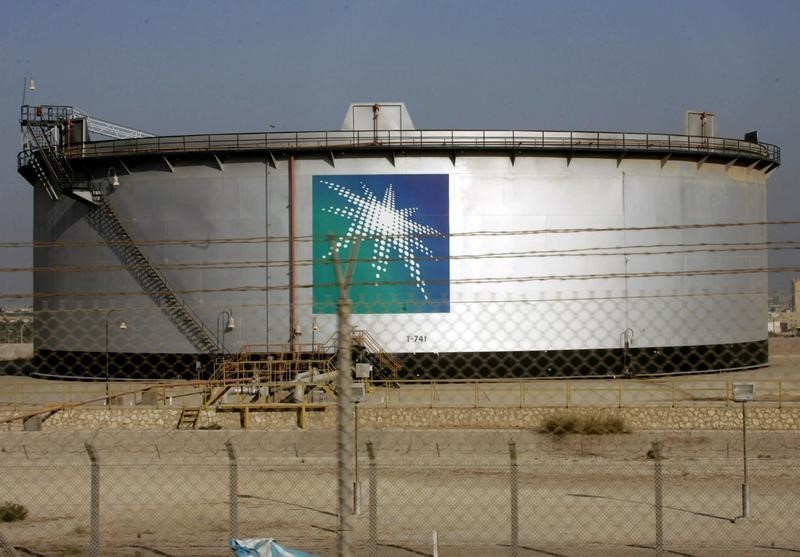(Bloomberg) -- Two years ago, when the initial public offering of Saudi oil giant Aramco held the imagination of foreign investors, President Donald Trump felt compelled to publicly lobby for the share sale to happen in America.“Would very much appreciate Saudi Arabia doing their IPO of Aramco with the New York Stock Exchange,” Trump tweeted in November 2017.Today Saudi Aramco isn’t just shunning New York -- and other international exchanges -- as a listing venue, but has decided it won’t even market the IPO to American, Canadian, European or Japanese investors. Instead, Aramco plans to rely heavily on ultra-wealthy Saudis, many of whom have been pressed to invest, to get the deal done. Saudi banks are loosening lending regulations to allow locals to buy more shares.
The IPO once was promoted as the strongest sign of economic change in Saudi Arabia: the deal that was going to attract tens of billions of foreign capital into the kingdom. Instead, a slimmed down share sale is starting to look more like a levy on the country’s economy as Saudi investors, large and small, take the place of foreign money managers.It may well still be the world’s largest IPO, perhaps raising about $25 billion and valuing the company at $1.6 trillion to $1.7 trillion, well above the biggest names of Silicon Valley. But that’s short of the $100 billion that Saudi Crown Prince Mohammed bin Salman said he was hoping to raise when he first mooted the IPO in 2016. At that point, he targeted a valuation of at least $2 trillion.“The valuation range is higher than most institutional investors would consider attractive,” said Neil Beveridge, analyst at Sanford C. Bernstein & Co. “Aramco’s price range would imply a premium valuation to western oil majors on almost every valuation metric.”The new valuation implies Aramco, which has promised a dividend of at least $75 billion next year, will reward investors with a dividend yield of between 4.4% and 4.7%, below what other oil majors pay. Exxon Mobil Corp (NYSE:XOM). pays a dividend yield of just under 5%, while Royal Dutch Shell (LON:RDSa) Plc pays 6.4%.
So poor is the international appetite for the deal, even at the lower valuation, Saudi Aramco decided at the last minute against marketing the IPO in the U.S., Canada and Japan -- three markets traditionally seen as a must-go destination for any big Wall Street deal. Instead of the planned approach to American investors, using what lawyers and bankers know as the 144A rule of the U.S. Securities Act, Aramco decided on Sunday the tepid interest meant it wasn’t worth the trouble.
The array of Wall Street banks, including Goldman Sachs Group Inc (NYSE:GS), Morgan Stanley (NYSE:MS) and JPMorgan Chase (NYSE:JPM) & Co, with mandates to sell the stock to international investors, were taken aback by the sudden decision, according to people familiar with the matter, who asked not to be named discussing private conversations.
Skipping the U.S. means saying goodbye to powerful American pension funds with billions of dollars managed from cities like Boston and Los Angeles.
On Monday, Aramco’s banks told investors in London and other European cities that roadshow events planned for this week had been canceled.
In a sign of Aramco’s shifting ambitions, the company has yet to publish an English version of the updated prospectus, more than 24 hours after the Arabic version posted the target price range.The difference between local and foreign investors is that Prince Mohammed, the country’s day-to-day ruler, has leverage at home. Overseas, he has almost none.
Many of the rich Saudi families that will now become key investors in Aramco learned the ruthlessness of Prince Mohammed during the crackdown that saw many arrested in the Ritz Carlton hotel in Riyadh in 2017. Prince Mohammed also controls the local banking industry, which will lend billions of dollars to Saudi retail investors to buy shares.Despite the tepid interest overseas, the 34-year-old Prince Mohammed is all but sure to get the job done -- even if the result falls short of his original ambitions. As well as a lower valuation between $1.6 and $1.7 trillion, it won’t be the 5% of company’s capital he envisioend. Instead just 1.5% will be offered.
The combination of a lower valuation and a smaller stake means that there will almost certainly be enough Saudi money to buy the shares – and perhaps guarantee reasonable post-IPO trading -- but the sale will be a long way from the seismic global financial event Prince Mohammed touted in back in 2016.
